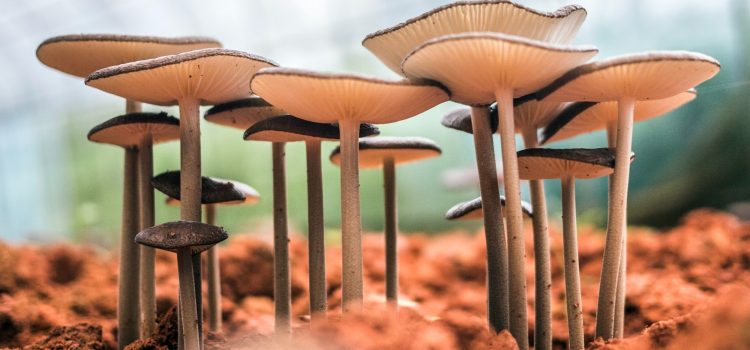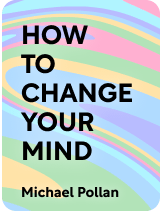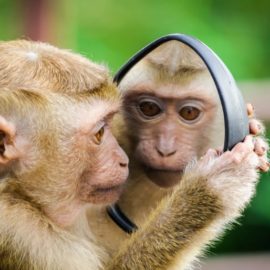

This article is an excerpt from the Shortform book guide to "How to Change Your Mind" by Michael Pollan. Shortform has the world's best summaries and analyses of books you should be reading.
Like this article? Sign up for a free trial here.
What are some unexpected benefits of psychedelics? How do psychedelics contribute to humans’ cognitive and spiritual evolution?
In How to Change Your Mind, Michael Pollan explains that psychedelics have important social and cultural implications for human society. Psychedelics may have even helped early hominids evolve into the self-aware homo sapiens we are today.
Check out how these substances could help get us out of some of our modern messes.
The Stoned Ape Theory
One question posed by Pollan, and which other researchers have pondered, is: Why would these plants and fungi evolve with properties that affect the human mind this way? Some researchers believe that the production of these chemicals by plants and fungi is in service to a symbiotic relationship with humans. And some researchers even suggest that these altered states of consciousness may have been crucial for humanity’s evolution, a main benefit of psychedelics that Pollan describes.
In 1992, ethnobotanist Terence McKenna proposed the “Stoned Ape Theory.” His hypothesis was that the cognitive development of hominids was due to their consumption of psilocybin mushrooms, which caused an evolutionary leap in consciousness. The theory suggests that this leap allowed for the development of language, religion, and other forms of symbolic thought—traits that distinguish humans from any other species. Pollan points out, though, that the theory has been contested by other researchers, who argue that there’s no concrete evidence to support it.
The effect of these chemicals on humans could be explainable by arguing that they’re toxins, meant to “poison” predators as a self-defense mechanism. However, Pollan learned from mycologist Paul Stamets that human ingestion of mushrooms actually helps the fungi, as the consumer will eventually eliminate their spores elsewhere. Stamets argues that the psilocybin is more likely an attractant for hosts rather than a deterrent to predators. And more than just a reproductive strategy, Stamets believes there’s a higher intelligence on Earth that’s attempting to communicate with us through fungi. He argues that fungi are intelligent and that they offer their mind-altering properties to us in exchange for our spreading of their spores.
Although Pollan is skeptical of some of Stamets’s more radical claims, he admits that his own psychedelic experiences have inspired a feeling of a connective consciousness pervading all of nature.
Are Psychoactive Compounds Attractants or Repellents?
Scholars don’t necessarily agree with Stamets’s hypothesis that fungi developed psychoactive properties to attract humans. Some argue that the psilocybin is meant to deter insect predators. Because these fungi tend to grow in environments with many insects, typically in animal dung and rotting wood, they may have developed these properties to interfere with the insects’ neurotransmitters. Scientists have shown that interference with flies’ neurotransmitters in this way decreases their appetite.
However, even if psychoactive fungi didn’t intentionally co-evolve symbiotically with humans, there’s scholarly evidence to support the claim that they may have facilitated our ancestors’ evolution and survival in several ways, including:
- Helping them cope with challenges and think more flexibly, contributing to creative problem-solving in challenging times
- Helping them manage psychological distress and health problems
- Improving social interactions and relationships by creating prosocial bonds through the use of psychedelics in ritual
- Contributing to the development of music, storytelling, and religion—some of the very traits that make us distinctly human
“Depatterning” Could Save the World
During Pollan’s research, he found that many experts involved in studying psychedelics have eventually shifted their emphasis from the treatment of individuals to the potential for the treatment of society as a whole. He explains that this is because the benefits of psychedelics may contribute to greater empathy, a deeper sense of connection with others, and a reconnection to nature. On this last point, many argue this could be a key to solving the growing environmental crisis.
(Shortform note: A 2019 study examined the correlation between psychedelic use and “nature relatedness” and found a positive association. They found an increase in nature relatedness after a single psychedelic session that persisted for two years after that use, and noted a “strong relationship” between the amount of lifetime use of psychedelics and nature relatedness.)
As we saw in the 1960s, psychedelics can also be disruptive to society. They can cause a shift in perspective that has the potential to subvert power structures, undermine established social institutions, and dissolve boundaries—such as those between the body and mind, the spiritual and material, and healer and patient. But, Pollan asks, are some of those disruptions exactly what we need in society right now? He and other scholars suggest that the timing of this psychedelic renaissance is no coincidence.
Ethnobotanist Giorgio Samorini says that psychedelic experiences disrupt our deeply ingrained patterns of thought and allow us to develop new creative ways of thinking. He calls this “depatterning” and says when societies are in rapid states of change or high-challenge situations, this ability to think in novel ways is crucial for adaptation and survival. So he concludes that psychedelics can be a tool for survival that humans turn to during specific time periods, such as when they’re facing challenges that need out-of-the-box thinking.
Pollan suggests that humanity as a whole is presently facing such a crisis, calling for a widespread depatterning. The enthusiasm around psychedelics in the 1960s may have been the first signs of this call to action. And of course, when there’s any movement toward social change, the established powers will attempt to stop it, to preserve the existing institutions and hierarchies. Pollan explains that we saw this happen with the ban on psychedelics in the 1970s, and we see it with the continued resistance today. This is why Pollan believes we must, as a society, “change our minds” about psychedelics, by making them widely accessible for use in mental health care.
Psychedelics Could Help Create a More Just and Equitable World
The anthology Psychedelic Justice: Toward a Diverse and Equitable Psychedelic Culture addresses ways that psychedelics might contribute to a more just and equitable world. Essays in the book suggest that social justice advocates today may be unintentionally creating more division by focusing on so many different issues of inequality as though they were separate phenomena. The complexities involved with many intersecting dimensions of inequality in the 21st century may require a novel approach, and the book argues that psychedelics could offer that.
It hearkens back to the counterculture movement of the 1960s, pointing out that prominent figures in that movement recognized the value of psychedelics as being in the potential to change minds. This reinforces the premise that Pollan has embedded in the title of the book: How to Change Your Mind.
So, the collection of essays in this book suggests that rather than simply trying to fight every systemic issue at the level of policy, we should be confronting the root of the issue: the way people think. And psychedelics could help to change the attitudes that created the systems of inequality in the first place. This could address issues like sexism, patriarchy, homophobia, and binary thinking that harm individuals.
The book argues, overall, that we should be working to integrate psychedelics into society as a whole, and it offers some guidance on how to do that while respecting indigenous communities and mitigating the potential risks and dangers.

———End of Preview———
Like what you just read? Read the rest of the world's best book summary and analysis of Michael Pollan's "How to Change Your Mind" at Shortform.
Here's what you'll find in our full How to Change Your Mind summary:
- The long and complex history of humans' relationship with psychedelics
- Psychedelics' potential use for mental health treatment today
- Why there are so many cultural and legal issues surrounding psychedelics






